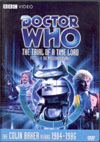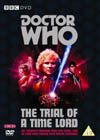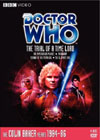The Trial of a Time Lord
DVD Extras include:
The story's opening is nothing short of awesome, instantly grabbing attention with a brand new version of the theme tune, and flowing smoothly into an opening model shot that can easily put "Return of the Jedi" to shame. Seriously. In fact, it's quite unusual to get good establishing shots of Gallifreyan architecture on this show, so very well done indeed. It never is explained in this season though, why the Time Lords are conducting this inquiry/trial on a space station, and not on the home planet of Gallifrey as one would expect. Still, it's a VERY cool touch to see this technological extension of their society, and nice that it looks as though it first came into service long ago in the days of Rassilon's Bowships or something. Part One here is VERY smart to start off with just the characters we know, and only introduce new ones as they are encountered, allowing the cast list to grow at the rate at which the audience can appreciate them. The opening exploratory effects sequence doesn't finish until the TARDIS exterior has materialized and the Doctor has come out to peer into a few sinister rooms on the station. Immediately, he gets to meet and interact with the two most important guest characters of the season, the Inquisitor and the Valeyard, and the new format of watching the Doctor's adventures on a screen in the Trial room is laid out. We may actually have Jonathan Powell and his notes on the script to thank for this level of clarity, as prior to that the production team seemed keen to pull one of those silly stunts where they try to hold back until the first cliffhanger the information that they teased you with in the story's title. It is better the way it actually ended up on screen. And where UNIT headquarters often took over from the TARDIS interior as the show's base of operations, so now does the trial room take over for this season. In the cases of these individual stories making up this season, it actually works well and the TARDIS interior is not really missed. After all, the previous season had been saturated with TARDIS interior scenes that usually just delayed the regulars' involvement in the stories, so we've got another improvement here.
Prime Redundancy?The main subject of this trial may easily seem redundant to both long-term viewers as well as those familiar with the modern show. The Time Lords of the Doctor's home planet of Gallifrey seem to subscribe to something very similar to the Federation's Prime Directive on Star Trek, BUT, unlike Captains Kirk, Picard, or any of the other lead characters in the shows of that franchise, the Doctor has never made any claim to either believe in or follow such an edict. In adventure after adventure, he espouses the role of hero, and jumps straight into it. What few exceptions there have been over the last 140 odd televised stories are usually disappointments, unworthy of the attention of the cameras used to capture them. Perhaps this is why, in the Doctor's previous trial in "The War Games" (story no. 50), that trial's actual arguments prior to the verdict only lasted about two minutes, during which the following tell-all exchanges occurred:
You've got to love the honesty of Patrick Troughton's Doctor in this almost judo-like move of giving the Time Lords their point, and then challenging the law itself at its foundation. Nice. All this raises an important question for "The Trial of a Time Lord". If the Doctor is NOT going to contest the fact that he interferes, and neither does he challenge the non-interference policy itself, what really is there left for the court to decide? Have the Time Lords and the Doctor not already come to the conclusion that they must disagree on this point? Here, in "The Trial of a Time Lord", the Doctor exclaims "Not guilty!" to the extremely vague charge of "conduct unbecoming a Time Lord", which could really mean anything. Then, when the non-interference schtick is laid on as well, he attempts to sidestep the whole thing by mentioning the end result of the political maneuvering of the last four Gallifreyan stories. Perhaps that's not a bad idea, if he knows the debate itself is pointless. Most curiously though, he isn't really pressured to enter a plea on the non-interference charges before the evidence begins. All of this somewhat validates Jonathan Powell's criticisms of the clarity of what the characters are actually attempting to prove or disprove with their evidence. Yes, this can easily leave any audience, knowledgeable or not, confused. But the truth is the truth of character, which includes much deviousness and hypocrisy this time around. Such "prime directive" concerns are only the details of the cover story, designed to send you round and round in circles instead of getting at the real story underneath. But since the viewer is asked to engage in this cover story for the next 12 episodes, it is too bad that it couldn't have been designed to work more immediately on its own. In actual fact, the trial does manage some decent arguments above the usual entrappings of Star Trek's Prime Directive. Thankfully, there are no pretentious notions of what any other society's "natural development" should or should not be. Instead, this trial manages to focus quite nicely on whether one person's influence is helpful or detrimental, and also whether it is wanted or unsolicited. Excellent criteria. But a bit at odds with what Time Lords are supposedly looking for. All of which keeps open the question of what is REALLY going on here, politically, behind the scenes.....
Revealing Ravalox...The more immediate adventure starts out by expertly establishing the mysterious planet Ravalox and sticks with just the Doctor and Peri for a while, which is a nice move. Refreshingly, their relationship seems to have matured drastically. Instead of the constant irritable barbs, it actually appears that they have developed an endearing rapport with each other since we last saw them. I particularly enjoy the scene with the very moving "Nothing can be eternal" speech, which is enhanced by one of the story's most emotional musical cues. All good. Although I often wondered why the story neglected to show them arriving in the TARDIS (it's always good to know where it's parked when the stakes start to raise and you want to know what the Doctor's options are), such an arrival scene was shot - but so undermines the progress of the Doctor and Peri's relationship that I'm not sorry it was left out.Glitz and Dibber are introduced next, and although they're technically not meeting the Doctor and Peri yet, they are clearly establishing a geographical relationship and a tactical assumption. In fact, Glitz's little mission briefing recap here nicely triggers intrigue as to what the Doctor and the audience may yet discover on the planet..... And the story soon splits between these two duos, only adding more cast members as the two duos encounter them. Glitz is definitely more interesting than most of the other mercenaries that script editor Eric Saward loved to include during his reign on the show. Mostly we can put that down to his "lovable rogue" charm. He does seem more hard-nosed here in his debut episode, but I think we should note that it's his dialogue that is giving that impression. Watch carefully what he actually DOES... failing to take his sniper shot on time, preferring talking to violence over and over again, and in the end you have to wonder if he isn't trying to put on a bit of an act in front of Dibber to make himself look tough and maintain a weird sort of morale amongst criminals. One of the highlights amongst the casting is having Queen Katryca played by Joan Sims, one of the regular stars of the popular "Carry On..." series of comedy feature films. Sims works well to create a strong, commanding presence for Katryca in early episodes, but sadly the writing encourages more melodramatic shenanigans as it later decays.... Tom Chadbon's character Merdeen isn't bad and remains watchable, but is far from a tour-de-force performance. One is left feeling that there should have been much more going on with this character, and somehow it just never happened. Perhaps part of the problem is that the underground society here is just never fleshed out all that believably. We know that they have a small library and value water very highly, but how and where do they live down there? We end up getting too many guards, trains, and bright corridors on screen, instead of ROOMS filled with real situations that can give the characters something to hook their hopes and defences and conflicts onto. Was Balazar reading to his fellow Dead Poet Society members on the other side of the doors, clubs at the ready, just before the Doctor triggered the alarm? Is it another Holmes oversight that not a single female appears as part of the underground society? At the very least, the mysterious "culling" process that later episodes refer to needs to be demonstrated and motivated, before the struggle against it can begin to resonate with the audience. Drathro, the "Immortal" L-3 robot is one of the tale's more successful creations, and his design is probably one area where more money proved beneficial. A very solid look is made very dexterous and expressive, and combined with good vocal work, the robot can hold his own while acting with Britain's finest.... when he gets Britain's finest like Colin Baker, Tony Selby, or Tom Chadbon to act opposite. In an inexplicable repeat of Holmes' first Doctor Who script "The Krotons" (story no. 47), Drathro makes a habit of recruiting the two "brightest" locals to help him inside his lair, only this time it's a cinematic disaster. Like the previous duo that Avon finds in the Blake's 7 episode "Orbit" which Robert Holmes also wrote, they can make you wonder why you're still watching, but at least the duo from "Orbit" begins to work after a few minutes. Here, Humker and Tandrell, or whatever their names are, become the poster-boys for the story's excesses of irritability. Ideally the show should lose as much excess footage of these two as possible. Particularly during Part Three, it seems that for every two lines of dialogue they have that are critical to the plot, there are another ten begging to hit the cutting room floor along with Drathro's irritated reaction towards them.
Uninspired PaddingThe scripts for Parts Two to Four also seem to be grasping at straws to find excuses to return to the Trial room at regular intervals and remind viewers of the larger stakes for the season. Sometimes, we get a really good scene, at other times we get nothing but a lot of obvious fluff. The writers should free themselves from the compulsion to fill time by padding the script with dialogue. Instead take a lesson from the nearly equally long "The Dalek Masterplan" (story no. 21), whose fifth episode in particular shows a good example of a script that was left lean, while director Douglas Camfield and musician Tristram Cary filled in lots of space with purely cinematic, atmospheric shots and sequences.However, excusing the padding, the scenes we still need to move the story forward are fairly well done. Particularly on first viewing, I had come to expect a slow pace from Holmes, and was pleasantly surprised when things picked up half-way through the second episode and the plot kept on rolling, minor padding aside, throughout the later episodes and right through to the finish. The L1 robot is a more successful prop than ones used for similar ideas in this show's past, making for some fairly decent location action sequences. Things could have gone up yet another notch had decent lasers been superimposed in for this story, but what we get here isn't too bad.
Clarifying Roles and RebuttalsThe comments of then BBC Head of Drama Jonathan Powell (available as part of the DVD's pop-up production notes), particularly in combination with Eric Saward's rebuttals on his solo audio commentary track, are quite interesting, and in many ways foreshadowed reactions of fans and audiences towards the finished product. Keeping in mind that Powell was commenting on a prior version of the story, I think most of his comments are valid and, in the end, constructive. What comments of his they took on board undoubtedly strengthened the tale, particularly in clarifying the opening.I will disagree vehemently with his opinion of Glitz and Dibber, who continue to be a large part of the draw of this story, and Saward's clueless attempts to defend them show that he has fallen hook, line, and sinker into one of Powell's misconceptions about them. From where does this assumption come that they are the antagonists of the story? Because clearly that isn't the story function at which they are excelling. The antagonists are the Valeyard on the season/trial level, and on the immediate local level Drathro first and foremost, with Katryca as a secondary or rival antagonist. Glitz and Dibber are rival PROTAGONISTS, and we become as invested in their adventure in this world as we do in the Doctor and Peri's. Nowhere is this more clear than at the story's very effective climax, when Drathro needs to be defeated to save this civilization (and just possibly the rest of the universe as well, although it is a nice touch that this expansion of scope is only speculative, since I for one won't be buying it). Both the Doctor and Glitz have important heroic contributions to make to ensure a happy resolution, with Glitz's portions actually upstaging the Doctor's in terms of dramatic entertainment value. This immediately puts him on the same level as Vorg from "Carnival of Monsters" (story no. 66), or Hal the Archer from "The Time Warrior" (story no. 70), or Rogin from "The Ark in Space" (story no. 76), or any of the many other guest characters who stole a story's "final fix" away from the Doctor in a Robert Holmes story. "The Mysterious Planet" is better than most of those in that sense, since the Doctor and Glitz have a very different methodology to their attempts to achieve the same thing here, and in the end it is both of them working in tandem delivering a nice one-two punch that saves the day. Very well done. Indeed, the Doctor is far better occupied here than in "The Caves of Androzani" (story no. 136) (not too difficult to accomplish), and remains busier and a bit more on the ball than in "The Two Doctors" (story no. 141). Sadly, I will have to give the writers a failing grade in astronomy. The Valeyard introduces Ravalox as "a planet within the Stellian Galaxy", making one assume it is outside our massive Milky Way. We later learn that it's only two light years away from Earth's position. Considering that the closest star to our own is at least 4.3 light years away, the writers really haven't put Ravalox where they need to, to make it work for their story purposes, and indeed don't seem to have a clue where anything is in the heavens. For 1986 writing, the audience deserves better. Equally vague are the references to Andromeda, a name which at its most basic level, only indicates a direction in space, like a bottomless pyramid in space with our solar system at the apex and the shape of the ever-widening base drawn arbitrarily on our maps like national borders over continents. There are plenty of stars in our Milky Way galaxy in that particular direction, any of which this story could be referring to, but of course the most famous object within the constellation-direction of Andromeda is another galaxy very similar to ours and some two million light years distant. It's a pity that this story fails to better define what it talks about, but I guess the writers don't care. Of course, we can't leave off without mentioning this story's fabulous musical score by newcomer Dominic Glynn, who easily sets the definitive memorable musical tone for the season here. So many important themes are first defined here, beyond the obvious ones like the new Doctor Who theme and the trial theme introduced over the magnificent opening shot. Glitz also gets a very definitive and memorable musical phrase, suitably sneaky and shifty, yet also working well for his many humorous moments. Many more characters and situations also get themes and motifs that recur often throughout the score, which maintains a basic moodiness very appropriate to the trial, and it is very hard to find anything truly objectionable anywhere in it, unlike some of the work in previous years. Very nicely done. One more point - after these four episodes go by, one may indeed be wondering why the Valeyard would try to use this particular adventure to prosecute the Doctor. Surely much more damning evidence existed in countless previous episodes that viewers could remember, while this one threatened to reveal things the Valeyard seemed to prefer to keep secret. But, when all is said and done for the season, and taking into account the way Holmes likes to satirically portray Gallifreyans as being too devious for their own good, plus the fact that this did start out as an "impartial inquiry" not necessarily triggered by the Valeyard's party, this hasn't been a bad start to the season at all. Perhaps what the trial section needed most was a second, more private set for the Doctor to retire to once in a while to chat with defensive council or other pseudo-companion(s) and ask some questions about the motivations of characters on the trial/season level. Hopefully this could also result in fewer interruptions of the adventure, but make those interruptions that do occur become more substantial and interesting.... something structured more like the flips between universes in "Inferno" (story no. 54).
International Titles:Deutsch: "Das Urteil 1-4: Der rätselhafte Planet"Magyar: "Egy Idő Lord tárgyalása 1-4: A titokzatos bolygó"Français: (Le jugement d'un Seigneur du Temps 1-4: La Mystérieuse Planète)Русский: "Суд над Повелителем времени 1-4: Таинственная планета"This story is available on DVD and VHS video as the first adventure of the Trial of a Time Lord season box set. Click on the Amazon symbol for the location nearest you for pricing and availability:
Comments on this article are welcome. You may contact the author from this page:
|











